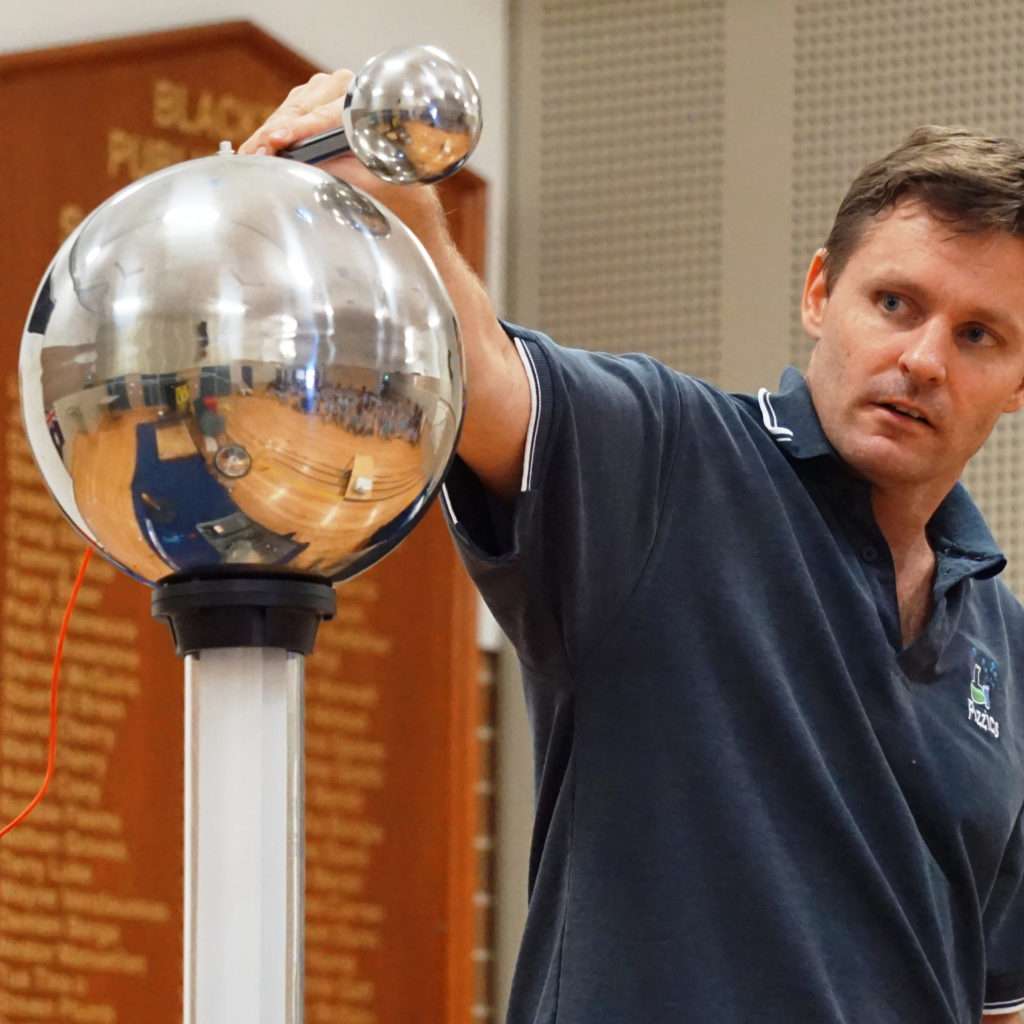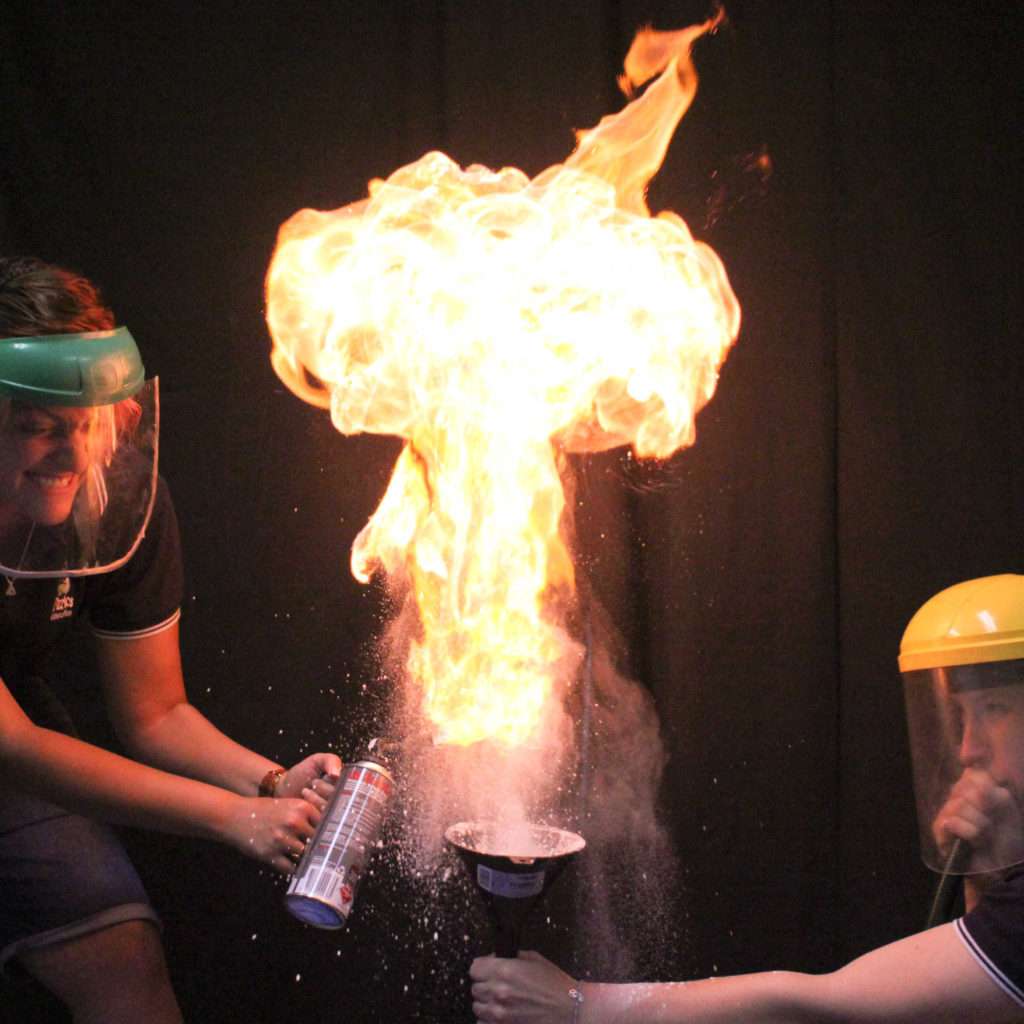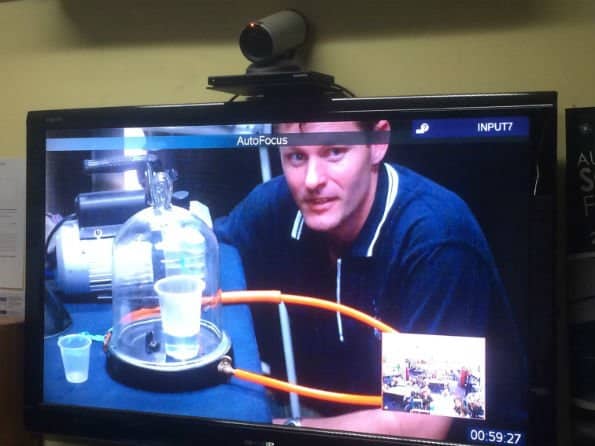Generating static charge during a science show
Remember Professor Julius Sumner-Miller, the lecturer who first brought simple engaging science experiments into people’s homes via TV? Wow, did he start something! Before Prof. Sumner-Miller’s time, science in school was constrained to textbooks, some teacher demonstrations with fancy scientific apparatus and the occasional hands-on experiment if you were lucky. Prof. Sumner-Miller’s ideas of demonstrating science using simple materials have been taken up by primary and science teachers throughout Australia; in fact, you would struggle to get through a teaching degree without being exposed to this way of teaching.
Fireball during a Big Science school show
I’ve got to say I may have one the best jobs going around; I run Fizzics Education which is a company that visits primary and high schools across Australia to run science workshops and shows. A science communicator’s role in schools is to inspire students to want to study science and have the students learn a few concepts whilst getting involved in some hands-on discovery learning. From my perspective, I can’t think of a more varied and challenging way to use my previous high school teaching experience. On one day we might work with thirty children at a preschool and then run a physics workshop for year 11 and 12 in the afternoon… knowing that the next day we might need to be at a science festival to present a large stage show for a mixed age audience of upwards of 300 people. Each day can present quite a task when you have no idea of the audience’s prior background or whether they have the ability to understand English prior to the event. Add science lessons via video conference into the mix and it gets quite hectic!
Science classes via video conference
As we see the entire curriculum, from preschool through to Year 12, a science communicator gets a unique perspective of why certain concepts are in the syllabus at certain times. Seeing thousands upon thousands of students each year perform scientific investigations allows you to see how students as learners operate in a general sense, forcing the creation of experiments that are accessible regardless of a student’s prior background. Having so many students use your apparatus can very quickly highlight shortcomings in workshop material, as such our staff meetings nearly always involve discussions on how to make a certain experiment ‘bulletproof’, that is, how can we make a new experiment replicable in class; is it safe, age-appropriate, almost unbreakable and relevant to the curriculum content so that we can be confident that it can be included on the next road trip to western NSW? Often constructing a workshop becomes a balance between showing the ‘wow’ stuff that you just cannot get in the average classroom to demonstrating that a certain concept can be taught with just some bits and pieces found in kitchen and craft cupboards, all the time knowing that the experiments need to be squeezed into a 60 minute workshop. We want to show that science is everywhere and being invited to hundreds of schools provides a platform to do this. Taking feedback from students, teachers and from my staff makes workshop development a dynamic process and one that I thoroughly enjoy.
Presenting science to students of all abilities and cultural backgrounds is getting easier. Science pervades the media in so many ways; from children’s ‘edutainment’ programmes through to television commercials. As science is becoming more accessible to students science literacy is rising quickly. I can remember ten years ago presenting liquid nitrogen experiments to kids and not having a single person in the room having heard of the substance, now not only do students know what the substance is but they can also suggest experiments that could be interesting to try. This means that presenting science shows has become a much more interactive experience, taking questions from the audience and sometimes running an impromptu experiment on the fly to investigate an issue raised. So, have fun with science; whether you are an educator or not… the kids will enjoy it more and you’ll reap the rewards.
All the best!





























Comments